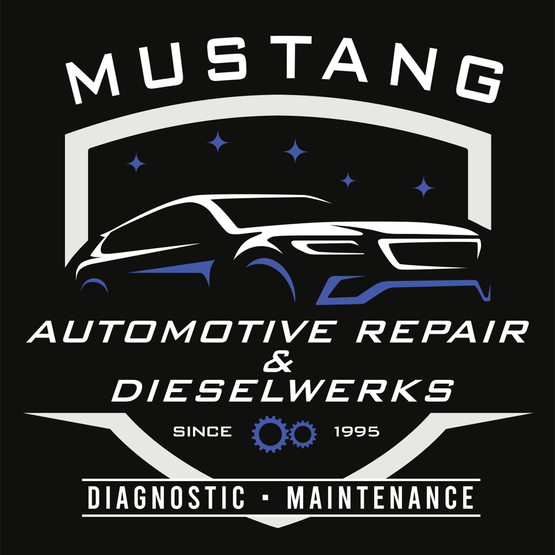Power Steering Service in Mustang
September 15, 2024
Most Mustang drivers are too young to remember life before power steering - cranking those great big steering wheels! It was a pretty good workout. Now power steering is standard. Let's look at how it works. The heart of any power steering system is its pump. The pump pressurizes the power steering fluid that provides assist for steering. Most pumps are driven by a belt that is run by the engine; a few are electrically powered. A high-pressure hose passes fluid from the pump to the steering gear. A low pressure hose returns the fluid back to the pump.
These hoses can develop leaks, so it is a good idea for Mustang drivers to have them inspected at every oil change. Low fluid can damage the power steering pump. That is why power steering fluid level is on the checklist for a full-service oil change. The fluid needs to be compatible with the hoses and seals, so check your owner's manual for the right type - or just ask your friendly and knowledgeable pros at Mustang Automotive in Mustang.
The fluid cleans, cools and lubricates the power steering system. It breaks down as the years go by and collects unwanted moisture, so Mustang drivers need to replace it from time to time. Many vehicle manufacturers specify power steering service intervals. Unfortunately, this important service is sometimes left off the car maintenance schedule for many of us. So, when in doubt, every 25,000 miles/40,000 km or two years is a good fallback. Your technician at Mustang Automotive will use a detergent to clean the system, flush out the old fluid and replace it with the good stuff.
Here are some warning signs of trouble with your power steering: It's harder to turn the wheel, there's erratic power assist, you hear loud whining coming from the pump (which may be difficult to hear over the loud whining coming from the backseat), you have to top-off the fluid frequently, or you hear squealing belts. Remember to never hold the steering wheel to the far right or left for more than a few seconds at a time. That will wear out your power steering pump quickly.
Other steering components can be bent or damaged from wear or hard knocks: ball-joint, idler-arm, steering-gear, steering-knuckle and tie rod to name a few. Warning signs here are steering play, wandering, uneven tire wear and an off-center steering wheel. An annual alignment check at Mustang Automotive in Mustang will reveal bent or damaged steering components.
Most SUV's, pick-ups and rear-wheel-drive cars need regular front-wheel-bearing service.
The bearings should be cleaned and inspected. If they are excessively worn, they need to be replaced. The bearings are then repacked in clean grease. The team at Mustang Automotive also recommends the wheel-seal be replaced when the bearings are serviced. Like everything else, check your owners' manual maintenance schedule. It's usually required around every two years or 40,000 miles/64,000 km. If you drive through water in the Mustang area, the bearings will need service more often.
Mustang Automotive
1600 E State Hwy 152
Mustang, Oklahoma 73064
405-745-4826
http://www.mustangautomotiveinc.com
Need Service?
More articles from Mustang Automotive

How Tired Are Your Tires? (Tire replacement)
March 1, 2026
Of the things you think about most, your tires are probably pretty far down the list. Thats understandable because todays tires are engineered to do their job without needing you to pay too much attention to them. But they DO wear out, and worn tires can contribute to skidding in bad weather, not... More

Greeted by a Screech (Loud Noise when Starting Vehicle)
February 22, 2026
No one likes to be greeted in the morning by having someone screech at you. The same goes for a loud, high-pitched noise your vehicle greets you with every time you start the engine. If you're wondering if that's normal, no, it isn't. And it is worth getting checked out. The good news is that... More

The Best Book that's Not a Best-Seller
February 15, 2026
Sometimes the movie is better than the book, sometimes it's the other way around. But when it comes to your vehicle, the best book of all is the owner's manual. The plot is simple: Owner wants long life and dependable performance from the vehicle, manual has the way to achieve that long life and... More











